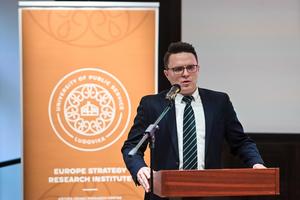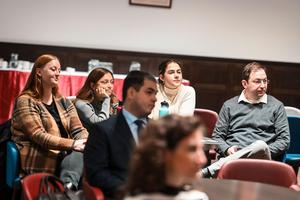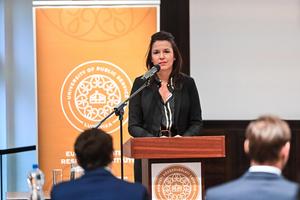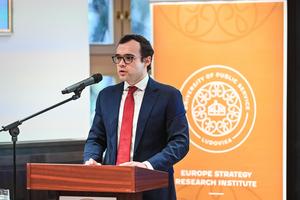"If we were to go to the United States and ask people if they know about Poland, the Czech Republic, Hungary, or Slovakia, most would probably answer affirmatively. However, if we were to inquire about the Visegrád Cooperation, perhaps some might have heard of this term, but they might struggle to explain it." Henry Barrett, a visiting Fulbright-Schuman scholar at the Europe Strategy Research Institute, Ludovika University of Public Service, delivered a keynote speech at the event “The Current State of the Visegrád Group – an American Perspective”, which took place on the 6th of December.
The expert, who is a visiting research scholar at the Europe Strategy Research Institute and the Institute for Political Science of the Hungarian Research Network during the fall semester and will spend the spring semester at the Europeum Institute in Prague, is researching the current state of EU integration among the Visegrád countries on the occasion of the approaching 20th anniversary of eastern enlargement. His research focuses on the rule of law framework and the conflict in Ukraine, examining how these processes and certain domestic political events influence the integration of the V4 countries within the EU.
In her introduction, Boglárka Koller, Vice-Rector for International Affairs at the Ludovika University of Public Service, highlighted that while in the past, neighboring countries have shown capacity for cooperation, collectively representing Central European interests, this might not be the current situation. She emphasized the need to address both the advantages and disadvantages of this cooperation in the face of current political challenges.
Henry Barrett stressed in his presentation that the Fulbright program places significant emphasis on mutual understanding between cultures. He mentioned that he traveled all the way from North America to the region to study its historical context and political priorities.
He recalled that the roots of the Visegrád Cooperation trace back to 1335 when the kings of Czechia, Hungary, and Poland formed a historical alliance in Visegrád. The present-day V4 officially formed in February 1991 when the Visegrád Declaration was signed by Václav Havel, first as the President of Czechoslovakia then of the Czech Republic, Lech Wałęsa, President of Poland, and József Antall, Prime Minister of Hungary. Barrett emphasized that the agreement covered several critical areas, including removing the remnants of the communist bloc in Central Europe, overcoming historical animosities among the Central European countries, and the conviction that social transformation and potential European integration could best be achieved through joint cooperation.
"I firmly believe that since its establishment in 1991, there hasn't been a period where this group can play as important a role in shaping the future of Europe as it does now," expressed Henry Barrett. He drew attention to a crucial turning point for the EU's future, which will also impact the Central European region, as next year will see EU elections and the formation of the new European Commission, during Hungary's presidency.
Barrett noted that due to the war in Ukraine, which is undeniably the most pressing issue for European security today, the EU's political focus has distinctly shifted eastward. He also reminded that between 2003 and 2021, there has been significant public support for cooperation, with V4 popularity increasing by 14%, from 59% to 73% in the region.
He emphasized that the V4 countries deal with topics such as EU enlargement, migration, security, and the Ukrainian conflict in terms of economic and military aid. According to Barrett, the rule of law framework and EU integration are two striking examples of how the V4 operate as an interest-based group. He added that the cooperation among these four countries is highly sensitive to domestic politics, EU policy, and the evolution of international conflicts.
"Of course, this does not imply that the V4 forms some kind of superstate, but collectively, the group can hold much more influence in EU institutions and on the European stage than individual nation-states," Barrett highlighted. He believes that as Europe approaches a change in 2024, the Visegrád Cooperation can strongly impact substantive political debates and thus shape the direction of the EU.
Following the lecture, a roundtable discussion included the aforementioned speakers along with Balázs Tárnok, Managing Director of the Europe Strategy Research Institute at Ludovika University of Public Service, and Gergő Medve-Bálint, Deputy Director of the Institute for Political Science of the Hungarian Research Network and professor at the Corvinus University. The panel discussed how the Visegrád countries have responded to evolving external pressures over the past two decades. Barrett perceives that the concept of interest-based relationships transcending borders and geographical distances is quite alien to the American mindset.
Text: Éva Harangozó, Laura Schmidt
Photo: Dénes Szilágyi




